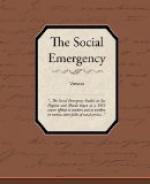FOOTNOTES:
[59] A. Forel, The Sexual Question, chap. XII, “Religion and Sexual Life”; William James, Varieties of Religious Experience, chap. I; especially the first footnote.
[60] F.W. Foerster, Marriage and the Sex Problem, chap. IV; especially section (d), “The Educational Significance of Monogamy.”
CHAPTER XII
AGENCIES, METHODS, MATERIALS, AND IDEALS
By William Trufant Foster
At the outset we observed that the present social emergency is not concerned merely with diseases, or physiology, or laws, or wages, or suffrage, or recreation, or education, or religion. All of these phases of the present situation, and many others, must be taken into account in our attempted solution of the problem of sex hygiene and morals. A person who believes that he can offer a quick and certain way out of our difficulties appears to have no comprehension of the problem. This much, however, is certain: the greatest need is public education. The policy of silence has failed. Accurate and widespread knowledge is a necessary condition of progress, whatever may be the chosen direction. The main questions at issue concern the Agencies, Methods, Materials, and Ideals of education.[61] The following propositions are intended as a brief summary of the most important truths concerning each of those four aspects.
I. AGENCIES
1. As there are but few parents who can and will give the necessary instruction, it must be given by other agencies, at least until a new generation of parents has been prepared to meet this responsibility.
2. Although the failure of parents calls for the immediate action of other agencies, the instruction should be so conducted as to break down the barriers of false modesty and establish confidence between parents and children.[62]




